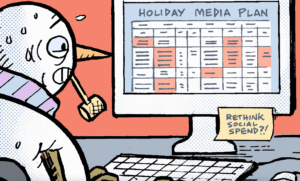![]() Ad tech observers tend to assume it’s early innings in the “programmatic-direct” game, but that may not be the case. Newly reported revenues from one early startup suggest the game hasn’t started yet.
Ad tech observers tend to assume it’s early innings in the “programmatic-direct” game, but that may not be the case. Newly reported revenues from one early startup suggest the game hasn’t started yet.
iSocket, a programmatic-direct platform company acquired by Rubicon Project in November, posted full-year revenues of just $207,000 in 2013, according to a filing with the US Securities and Exchange Commission. Taking into account the company’s $25 million sale price, the company was valued at about 100x revenue.
Rubicon announced its purchase of iSocket and ShinyAds in a single announcement. The company paid an estimated $30 million, suggesting the ShinyAds deal came in at around $5 million.
The filing suggests iSocket struggled to sell its programmatic-direct technology to customers. For the first three quarters of 2014, it earned just $165,000. Even assuming a blockbuster fourth quarter, iSocket would have grown 10%, tops, above its 2013 revenue numbers.
At the same time, iSocket was burning roughly $5 million a year. Its cash and cash equivalents totaled $3.1 million at the time of sale: iSocket had less than a year to sell or raise more money. With the paltry growth, there was no way it could be self-sufficient anytime soon.
But the high sale price, which included $10 million in “goodwill” above the company’s technical valuation, indicates that iSocket’s technology had some sparkle to it.
It also allowed Rubicon to plant a stake in programmatic-direct. “We wanted to … own this market,” Rubicon CEO Frank Addante told AdExchanger in the wake of the acquisition. “We believe this is going to be a $60 billion direct-order automation market.”
The deal could shave a year off Rubicon’s development of a programmatic-direct solution, and brings with it valuable relationships, said Ben Trenda, a former Rubicon and iSocket employee who is now CEO of Are You A Human.
Trenda said iSocket envisioned automated guaranteed as ” an intermediate step on the way to programmatic everything.” As part of Rubicon, it may be better positioned to take advantage of the spectrum of deals on the market, including buys guaranteed using Deal ID.
iSocket was the biggest of the programmatic-direct startups, but its small revenue numbers indicate the category is smaller than many industry estimates and will take longer to grow into a $60 billion market.
If iSocket took a 3% fee, for example, that meant that less than $7 million flowed through the platform per year based on its revenue. Even with a 1% fee, just $20 million of ad inventory was transacted through its technology.
But eMarketer put the programmatic-direct spend at $800 million in 2014, a 1,000% increase from 2013, when it put the market at just $80 million. If those estimates were true, iSocket didn’t share in any of the benefit. More likely, these early programmatic-direct estimates were grossly inflated.
When iSocket was founded in 2008, it expected that the direct market would take off just as the RTB market did. But as the SEC filing shows, that exponential growth has yet to truly hit programmatic-direct.










